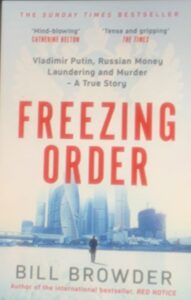Yeah, we know Vladimir Putin is a bad guy. But do we know all the ways he is bad? Paul O’Connor takes a look at a book that lays out some things you probably didn’t know. Very interesting things.
Reviewed by Paul T. O’Connor
FREEZING ORDER: A TRUE STORY OF RUSSIAN MONEY LAUNDERING, STATE-SPONSORED MURDER, AND SURVIVING VLADIMIR PUTIN’S WRATH. By Bill Browder. Simon & Schuster. 336 pages, hardcover. $28.99. Also available in audiobook from Recorded Books. Read by Adam Grupper.
 Vladimir Putin plays for keeps. Get in his way when he’s trying to steal your money, and he’s likely to get you sent to Siberia or killed.
Vladimir Putin plays for keeps. Get in his way when he’s trying to steal your money, and he’s likely to get you sent to Siberia or killed.
Bill Browder plays for keeps, too. No matter that you’re a dictator or crime boss, if you steal his money, or that of his clients, or kill his friends and colleagues, he’s going to come after you.
Thus, the adversarial tension of Browder’s Freezing Order, a sequel to his 2014 bestseller, Red Notice. Putin and his kleptocrats, on one side, and Browder, who can marshal powerful support of his own, on the other.
In Red Notice, Browder told how corrupt business people and government officials stole the assets of the Russian companies in which he, as a hedge fund operator, had invested. He made serious enemies, eventually being expelled from the country.
But his Russian lawyer, Sergei Magnitsky, stayed behind, determined to get the justice system to uphold the rule of law and protect investors from the powerful forces who were raping the economy. It turned out to be a naïve undertaking. Eventually, Putin and associates tired of Magnitsky, arrested him, held him in jail for almost a year, and then beat him to death in 2009.
And that’s where the sequel begins, with Browder determined to clear Magnitsky’s name, expose the corruption that led to his death, and finally to get even.
Today, Magnitsky haunts Putin and his kleptocracy from the grave. So-called “Magnitsky acts,” legislated in the United States and many other countries, authorize governments to seize assets from foreign leaders and their associates who violate human rights.
Freezing Order is Browder’s account of his own determined campaign to write Magnitsky’s revenge into law. It is a story of accumulating political support by collecting volumes of irrefutable evidence of corruption in the highest levels of the Russian government and business.
Working with private lawyers, international nongovernment organizations, prosecutors, journalists and legislators, Browder traced funds stolen from the Russian people right back to Putin and his cronies.
It is an eye-opening tale for those of us not versed in international banking and money laundering. Money, especially dollars, leaves a trail that, with exhausting work, can be followed through the intricate web of Russian and tax-haven-country shell companies. Browder, who appears to have limitless personal funds to unravel that web, finds the right people to do it.
The Russians don’t sit idly by, waiting to be exposed, of course. Using their legal system, they indict and convict both Browder and Magnitsky – despite the latter’s already being dead – for the theft of the funds in question. As he travels the world both for his work and on his mission, Browder must be ever vigilant to avoid being apprehended by Interpol and handed to Putin. Browder opens his book with just such an incident.
Although Browder is American-born and raised, he took British citizenship decades ago. Therefore, even when he is in the U.S., he fears he’ll be arrested and deported to Russia. When it becomes known that former President Donald Trump and Putin discussed this very possibility in private, he becomes even more concerned. Unfortunately, he can’t feel any safer in London, where ill-gotten Russian money has long bought political and judicial favor for oligarchs.
On several occasions, contacts warn that assassination squads have been hired to kill him. The warnings are believable because others who have worked to defeat corruption have fallen off buildings, been poisoned or shot. So Browder tries to hire bodyguards in London, only to find that most potential hires are Russian immigrants.
To this date, Browder has avoided Russian kidnapping, extradition and, maybe, assassination attempts. All the while, he has written two bestsellers that lay out, in very compelling tales, the corruption of the Russian state. And around the world, the Magnitsky laws, named after his late lawyer, lead to the freezing of assets gained through corruption and human rights abuse.
Browder has played for keeps, and won so far.